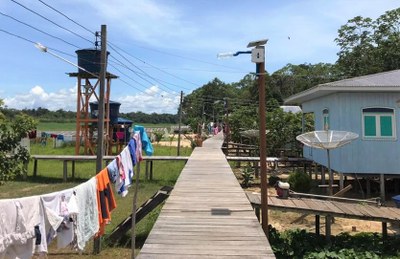Recycled material transformed into light fixtures in Médio Juruá
Riverine communities in the Médio Juruá Territory in the Amazonas state are not connected to Brazil's power grid, and often have to rely on diesel generators for their energy needs. The cost of generating power burning diesel means that streets, houses and community buildings only have electricity for a few hours at night, as they are switched off at fixed times, interrupting activities in the villages along the river Juruá.
Two months ago, the Santo Antônio do Brito and Toari communities, in the rural area of Carauari (AM), started benefiting from alternative lighting solutions. Low-cost solar-powered lamp posts – made of recycled material – were installed in 27 points in public areas, including alleys leading to the local school and to individual homes. In addition, 33 similar units will be used to provide energy inside homes. The solar power electricity has reached 120 people in the two villages.
A partnership between the Carauari Rural Producers Association (ASPROC) and the Litro de Luz (Liter of Light) NGO facilitated the initiative, launched under the Médio Juruá Territory Program, which is coordinated by SITAWI and supported by USAID/Brazil, Natura and Coca-Cola.
The system uses PET bottles, PVC pipes, LED lights, solar panels and batteries. Everything is done in coordination with community members who learn how to assemble and maintain the lights. Due to the COVID-19 pandemic, all activities followed strict health protocols, including testing, wearing masks and maintaining a safe distance to ensure community safety.
Residents trained to use and maintain the units are known as “ambassadors”. They receive the tools and materials they will need to provide support to the rest of the community. The lighting equipment is capable of operating for up to six hours straight.
Raimundo Nonato de Oliveira is one of the project’s young ambassadors. He says that they can now work at night after the generator is turned off.
In the Santo Antônio do Brito community, riverine residents report that they turn off their generator at 10 pm. Night students from the Luiz Campos Municipal School were required to walk home in the dark
At the Toari community, Francisca Figueiredo, one of the local beneficiaries, highlighted the importance of having light at home. “In the past, we spent many hours in the dark, and were unable to continue our activities late at night. Now we have light all night.”
History – This technology was invented by Alfredo Moser, a Brazilian mechanic who installed the first handmade PET lamp on his roof during a blackout in 2002. The idea was adopted ten years later by a Philippine NGO that promotes low-cost sustainable solutions, and has since spread around the world.
It was then brought back to Brazil in 2016 through the Litro de Luz NGO. In 2018, the project had already benefited over 56 communities in the Médio Juruá Territory, and 600 lamps made of PET bottles and LED lights were installed in other areas in Carauari.
At the time, an expedition accompanied the workshops to build the equipment. They interviewed local people and produced a video. Watch their stories here.



